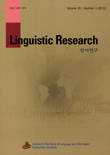- 영문명
- 발행기관
- 경희대학교 언어정보연구소
- 저자명
- Daeho Chung
- 간행물 정보
- 『언어연구』제29권 제3호, 541~562쪽, 전체 22쪽
- 주제분류
- 인문학 > 언어학
- 파일형태
- 발행일자
- 2012.12.31
5,440원
구매일시로부터 72시간 이내에 다운로드 가능합니다.
이 학술논문 정보는 (주)교보문고와 각 발행기관 사이에 저작물 이용 계약이 체결된 것으로, 교보문고를 통해 제공되고 있습니다.

국문 초록
영문 초록
Watanabe (2004) analyzes the traditionally called negative polarity item in Japanese as a negative quantifier (N-word), to account for the fact that it can be a fragmental answer to an affirmative interrogative sentence, despite the apparent polarity mismatch between the affirmative predicate in the antecedent clause and the negative predicate in the ellipsis site. The polarity disparity resolves in his system due to Agree between the N-word and the elided negative predicate, which induces the [NEG] feature of the former to get copied into the latter and ultimately cancels out the [NEG] feature of the predicate in the ellipsis site as an instance of double negation. This work argues that although Korean behaves like Japanese with respect to the N-word fragments, the negative quantifier analysis cannot be carried over to Korean based on the following two reasons: (ⅰ) the neg-feature-copy-followed-by-cancel- out mechanism leads to interpretation failure in some structures involving an N-word (e.g., an N-word as a short answer to a negative interrogative, an N-word in the RNR construction, and an N-word in the non-negation context); and (ⅱ) polarity mismatch can be induced by a non-N-word (e.g. acik ‘still, yet’ as a short answer to an affirmative interrogative sentence and selma ′(not) a chance’ as a short response to an affirmative declarative sentence). As for the availability of an N-word as a fragmental response to an affirmative sentence, it is speculated in this work, conforming to Ahn and Cho (2011), that such N-word fragments involve no ellipsis and they are to be pragmatically licensed. If this is on the right track, then the semantic isomorphic condition becomes irrelevant to such fragments, and the polarity mismatch problem disappears accordingly.
목차
1. Introduction
2. Problems with the NQA
3. Some speculation on fragmental answers in Korean
4. Conclusion
References
해당간행물 수록 논문
- On contrastiveness
- A construction-based analysis of the English modal be to
- Processing semantic and phonological factors in derivational morphology by Korean L2 learners of English
- The English present perfect and simple past tense
- Noun classes and subject honorification In Korean
- Exploring phraseological variations by concgramming
- Persistence and division of labor in grammaticalization
- A constraint-based approach to Icelandic case system
- Is amwu( N)-to a negative quantifier?
- Measuring linguistic accuracy in an EFL writing class
참고문헌
관련논문
인문학 > 언어학분야 BEST
- ChatGPT 기반 TOPIK 말하기 평가피드백 모형 개발 및 적용
- AI 기반 피드백의 교육적 활용 가능성 탐색
- 학문 목적 한국어 학습자를 위한한국어 교육과정 설계에서의 논점과 설계 근거
인문학 > 언어학분야 NEW
더보기최근 이용한 논문
교보eBook 첫 방문을 환영 합니다!

신규가입 혜택 지급이 완료 되었습니다.
바로 사용 가능한 교보e캐시 1,000원 (유효기간 7일)
지금 바로 교보eBook의 다양한 콘텐츠를 이용해 보세요!



